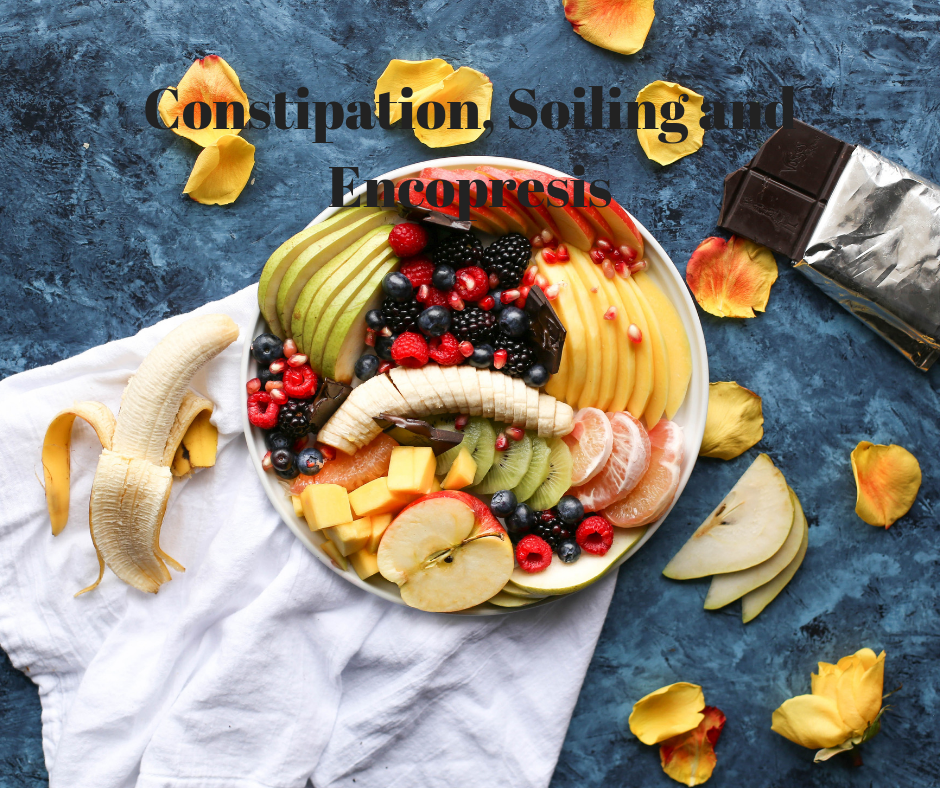Many parents may worry about how often their child goes or is constipated. According to research, 1-36% of children are constipated, which is more prevalent in boys. If your child has constipation or poos in their pants past their developmental age, you might have encountered the term ‘Encopresis’ or Soiling.
Eric the Bowel and Bladder Charity defines Encopresis as:
‘The passage of a normal poo in an inappropriate place’ – for example, a child who chooses to do their poo behind the sofa. It is not associated with constipation. Primary Encopresis is a name given to children who have never been potty trained. Secondary encopresis can be diagnosed following trauma or constipation. Hence, soiling is a general term for both.
What goes wrong in the body when we soil
When children become severely constipated, often from withholding their stool, the walls of the rectum stretch, and the ability of the external anal sphincter muscles to contract and keep the stool in the rectum is overcome by the stretch of the enlarged rectum, and stool then leaks out without the child knowing.
Children express their feelings through their behaviour
- Young children have limited ability to think and be reasoned with.
- They can’t link their feelings, thoughts, and behaviour in their early years.
- The brain sections responsible for these areas are not “switched on” in early childhood, starting at 5-6 years of age.
Children show their feelings through their behaviour due to the underdeveloped emotional brain:
When they are distressed, they show it through their behaviour. Hence, we might notice they suffer from the following:
- Sleeping, feeding & toileting difficulties
- Separation anxiety
- Anxiety, sore tummies and headaches, safety behaviours.
- Anger/tantrums / aggression
- Over-activity
- Shyness Withdrawal
Some young people have these feelings due to soiling, but it may be due to feelings about trauma, anxiety, and life circumstances. They cannot talk out or express their feelings. Hence, they may hold on to their poo and fear the toilet. Some children are terrified of falling into it or even being consumed by the toilet.
Your Child’s Emotional Brain
Children are primarily in their downstairs brains. Soiling and constipation are part of the limbic system, as stated above. The most profound and ancient part of the Reptilian Brain (not just lizards) controls basic, instinctive functioning and regulation. For example, hunger and elimination
What can help:
 1. This must be a multi-faceted approach that includes your paediatrician or GP/school nurse. If your child is constipated, you will need to have a healthy diet, drink lots of water, and exercise in combination with the medication to make the stools softer. Many parents stop this intermittently, but it is essential to take the medication regularly.
1. This must be a multi-faceted approach that includes your paediatrician or GP/school nurse. If your child is constipated, you will need to have a healthy diet, drink lots of water, and exercise in combination with the medication to make the stools softer. Many parents stop this intermittently, but it is essential to take the medication regularly.
2. Going to the toilet regularly helps too.
3. Help with Emotions.
Your child will feel awful about this and sometimes be scared too. Please help them feel safe using sensory mediums such as paint, clay, and water. Your child will want to ignore the siling or constipation due to feelings of shame, so try having a word for it. For example, “sneaky poo”.

Help them overcome their fears about the bathroom and toilet. Make it a relaxing place; let them read a book or listen to music, and feel more relaxed. There are some great fun sheets from Eric here at https://www.eric.org.uk/fun-stuff.
5. Help them clean up.
For younger children, this is not easy, but older children have a box with nice clean up things (such as friendly wipes, colourful pants, etc.). They can bring this to school and place it on a shelf in the toilet for disabilities. Teachers are happy to accommodate this.
6. Make sure you give your child a positive time with them independently.
I’ve worked with many children who unconsciously want to be a baby and regress to you to care for them, so give them time. Particular time each week, regardless of whether they poo in their pants.
In Conclusion
Remember, it is not your fault or theirs, and seek help if you need support. I am happy to offer psychological support once your GP or Paediatrician has examined your child in the first instance; contact me here.
For more Information and References:




